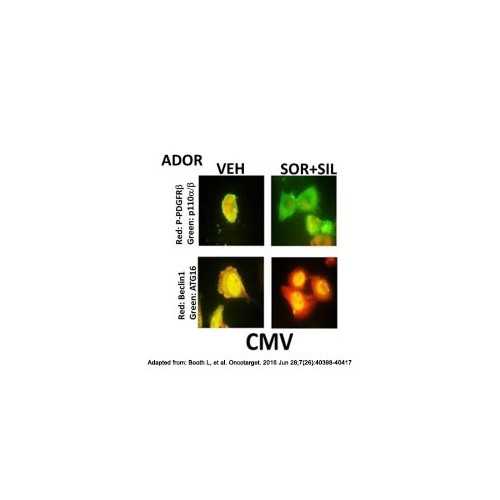NSCLC Patient Derived Xenograft (ADOR)
Fully characterized, patient-derived xenograft (PDX) model of Non-Small Cell Lung Cancer (NSCLC).
Highlights:
- PDX tumor model of NSCLC derrived from 74 year old female patient
- Cells are ready to use in vitro via standard cell culture techniques
- Capable of growing in SCID Mice, does not grow in athymic mice
- Fully characterized, see: Booth L, et al. Oncotarget. 2016 Jun 28;7(26):40398-40417
Patient derived tumor xenografts (PDX) are created when cancerous tissue from a patient's primary tumor is implanted directly into an immunodeficient mouse. PDX provides a new approach for preclinical testing of novel anticancer compounds in vivo due to its preservation of key features, which includes invasiveness, stromal reaction, tumor vasculature and cellular diversity of human carcinomas. In contrast to a cell line-xenograft tumor model, PDX tumors are established from the transplantation of fresh tumor tissue from a cancer patient into a immunodeficient mouse. As a result, PDX cancer models are becoming popular models to use in cancer drug research.
From the laboratory of Paul Dent, PhD, Virginia Commonwealth University.
Fully characterized, patient-derived xenograft (PDX) model of Non-Small Cell Lung Cancer (NSCLC).
Highlights:
- PDX tumor model of NSCLC derrived from 74 year old female patient
- Cells are ready to use in vitro via standard cell culture techniques
- Capable of growing in SCID Mice, does not grow in athymic mice
- Fully characterized, see: Booth L, et al. Oncotarget. 2016 Jun 28;7(26):40398-40417
Patient derived tumor xenografts (PDX) are created when cancerous tissue from a patient's primary tumor is implanted directly into an immunodeficient mouse. PDX provides a new approach for preclinical testing of novel anticancer compounds in vivo due to its preservation of key features, which includes invasiveness, stromal reaction, tumor vasculature and cellular diversity of human carcinomas. In contrast to a cell line-xenograft tumor model, PDX tumors are established from the transplantation of fresh tumor tissue from a cancer patient into a immunodeficient mouse. As a result, PDX cancer models are becoming popular models to use in cancer drug research.
From the laboratory of Paul Dent, PhD, Virginia Commonwealth University.
| Product Type: | Cell Line |
| Name: | ADOR |
| Cell Type: | NSCLC, adenocarcinoma |
| Organism: | human |
| Source: | Lung |
| Morphology: | Oviod with projections |
| Biosafety Level: | BSL-1 |
| Subculturing: | Do not subculture under 30% |
| Growth Conditions: | RPMI, 10% FCS |
| Cryopreservation: | Standard with DMSO |
| Age: | 74 years old female |
| Comments: | Tumor did not recur in the patient (18 months) |
| Storage: | Liquid nitrogen |
| Shipped: | Dry Ice |
- Booth L, Albers T, Roberts JL, Tavallai M, Poklepovic A, Lebedyeva IO, Dent P. Multi-kinase inhibitors interact with sildenafil and ERBB1/2/4 inhibitors to kill tumor cells in vitro and in vivo. Oncotarget. 2016 Jun 28;7(26):40398-40417.
If you publish research with this product, please let us know so we can cite your paper.


